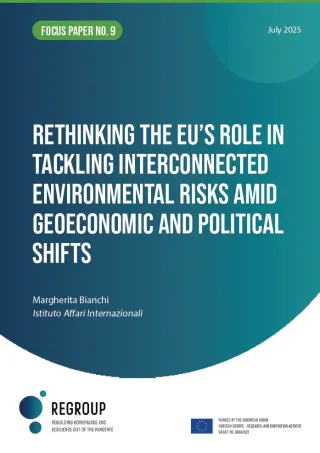Titolo completo
Rethinking the EU's role in tackling interconnected environmental risks amid geoeconomic and political shifts
This paper delves into the EU’s approach to interconnected environmental risks, set against the backdrop of evolving geoeconomic and political dynamics. It first addresses the European Green Deal, initiated in 2019, and its subsequent strengthening through initiatives like Fit for 55 and REPowerEU. These initiatives signal a strong commitment to decarbonisation and climate targets; however, the implementation of this ambitious agenda is being challenged by factors such as high inflation and increasing political resistance, with some governments expressing opposition to environmental policies. The prioritisation of security and defence has also somewhat overshadowed the climate crisis across the EU bloc.
The analysis examines the key features and trends of a decarbonised global landscape and the requirements for its effective management. It also addresses the internal and external challenges that will confront the EU in the period from 2025 to 2035. Given this background, the author evaluates four prospective scenarios where the EU does or does not have a role in a global governance reform that does or does not happen. In the first scenario, there is a reform of global governance but without an active EU role; the second scenario foresees ‘green globalisation’, where the EU leads the global governance reform; the third one involves a strong EU leadership but not channelled in a global governance reform; the final scenario lacks both a global governance reform and a strong EU leadership.
The paper ultimately argues that the EU needs to adopt internal and external measures to prevent the widening of the climate and social divide, both within the EU and between the Global North and Global South. It identifies several critical factors: finding a balance between engagement and disengagement with China, strengthening European industrial production where possible, and diversifying green value chains accordingly by forging stronger partnerships in the Global South. In this sense, the author argues that the EU must engage more effectively with emerging and developing economies in pursuing decarbonisation strategies. The paper cautions that increasing international fragmentation could lead to higher costs for accessing low-carbon materials and minerals, and it suggests that the EU should enhance its competitiveness through its inherent strengths while avoiding excessive and ineffective protectionist policies.


